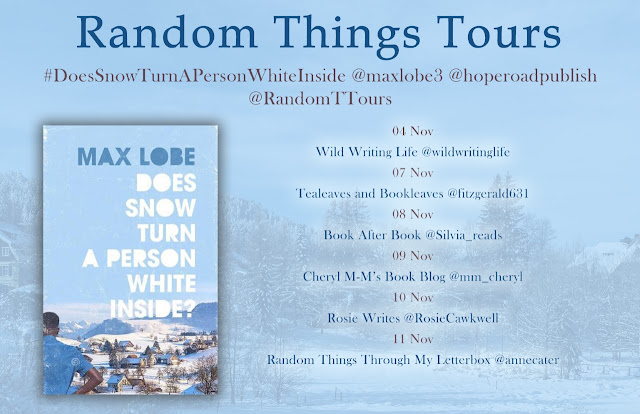Blog tour: Does Snow Turn a Person White Inside?
Welcome to the blog tour for Does Snow Turn a Person White Inside? By Max Lobe!
More about the book…
The narrator, Mwana, is a young man from Bantuland, living in Geneva. A graduate from a Swiss university, we first encounter Mwana waiting for a bus in the hills of Lugano gazing at a poster calling for “black sheep” to be sent home. Mwana’s efforts to find work are fruitless until he lands an internship in an NGO campaigning against racial discrimination. The team is busy organising a demonstration against the black sheep poster. Mwana has one foot in each culture. He sees Swiss society through African eyes, with all its contradictions: its moderation, stunning landscapes and its eccentricities, but also its intolerance and inflexibility. He also casts a critical eye on his native Africa, the weight of its traditions and beliefs.
Is belonging nowhere the price Mwana has to pay for these insights? Sad and playful Does Snow Turn a Person White Inside? is a moving reflection on the immigrant experience.
More about the author…
Max Lobe was born in Douala, Cameroon. At eighteen he moved to Switzerland, where he earned a BA in communication and journalism and a master’s in public policy and administration. In 2017, his novel Confidences won the Ahmadou Kourouma Prize. Other books by the author include 39 Rue de Berne and A Long Way From Douala published by Small Axes in 2021. Max Lobe lives in Geneva
An extract from the book…
I’ve been stuck up here on a big hill above Lugano for almost half an hour, desperately waiting for a bus that’s not coming. The sun’s at its height and is beating down on my shaved head, my kongolibon.
There’s an old lady near me. She’s wearing an elegant cream-coloured dress. Her long white hair sweeps her bare shoulders. It’s so hot that her foundation has run, exposing the fine lines around her eyes. This lady talks non-stop. She moans. She grumbles. She must be complaining about this outrageous public transport delay. And saying that they keep putting the fares up. I think I understand – she’s speaking in Italian. I smile at her without even knowing why. Actually, I can’t grasp much of this language. Just snatches I can make out in passing. But as my sister Kosambela always says, French and Italian are a bit like the Bantus and the Swiss: distant cousins, perhaps even close. All of a sudden, I can understand a tiny fraction of what the old lady is on about.
Across the road is a bus shelter for public transport vehicles going in the opposite direction from the one I’m waiting for. There are two youths there. Like us, their patience is running out. They look exasperated. A man in a sweat-soaked white vest trundles past with an orange wheelbarrow bearing the town’s logo. It’s a wheelbarrow belonging to the municipal highways department. Whistling, the man empties the bins. That at least, the look on the old lady’s face seems to say. She’s still beside me, complaining endlessly.
A poster close to the bin-man catches my eye. It shows three white sheep in a peaceful meadow – a red background with a white cross. One of the white sheep, smiling, is kicking out with its hind legs against a black sheep. On the poster are the words creare sicurezza.
I calmly have a smoke and contemplate the poster. The image strikes me as quite funny. Then I recall how the expression ‘black sheep’ was a favourite of my father, who was a soldier in Bantuland’s regular army. As well as black sheep, he would very often say: you KGB (for spy), or Senegalese honker or motormouth (for someone who was a chatterbox). When there was talk of traitors in the army ranks, or weaklings, or those killed in battle, my father always used to say jubilantly: they’re just black sheep!
The big bell of a distant church begins to toll. I realise that I’ve been waiting for my bus for nearly three quarters of an hour. At another time in my life, not so long ago in fact, I’d have taken a taxi. That’s what another lady did – no way was she prepared to hang around for more than five minutes. But the thing is, just over a year ago, as I was heroically finishing my Master’s, I learned that I had lost my job.
I was a travelling sales rep for Nkamba African Beauty. After nearly five years of dedicated and loyal service, my boss, Monsieur Nkamba, let me go. He did so without any qualms. He gave no real explanation. That was that, period: he was terminating our collaboration. Besides, we had no written contract. I sold his products and he paid me my gombo. It was all hush-hush. Between ourselves. Between us brothers from Bantuland. What am I saying? Nkamba was only originally from there. Because only a few months ago, he went over to the other side. He had proudly given up his Bantu citizenship and become Swiss. Exclusively Swiss. I’m a true-true Eidgenosse, I am! he would say, puffing out his chest. I’ve even heard that he voted for the far right. But I couldn’t care less about that. The most important thing for me was my job. And now I don’t have one.



Thanks for the blog tour support x
ReplyDelete